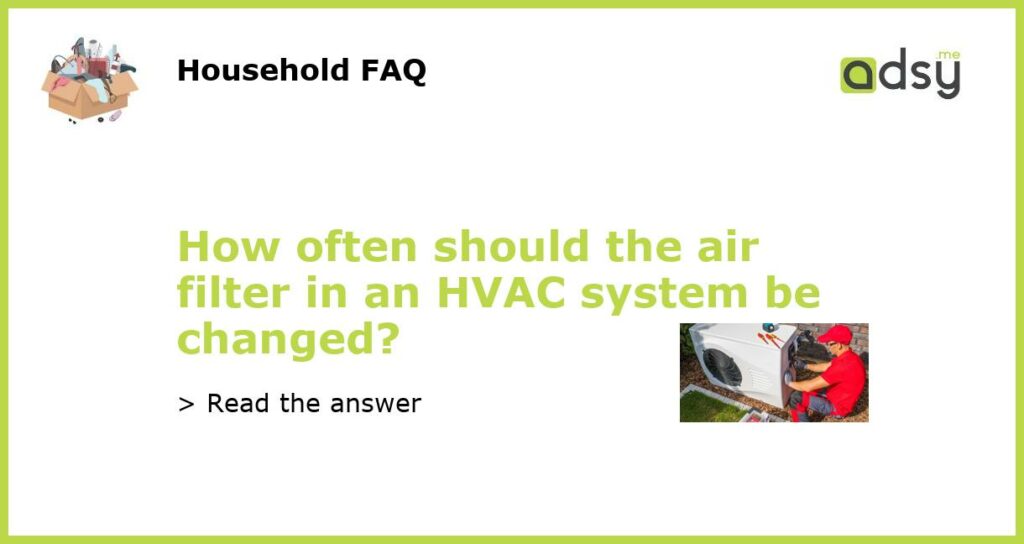How often should the air filter in an HVAC system be changed?
The air filter in your HVAC (Heating, Ventilation, and Air Conditioning) system plays an essential role in maintaining indoor air quality and the efficient operation of your HVAC system. It traps dust, pollen, pet dander, and other airborne particles, preventing them from circulating throughout your home. Over time, the air filter becomes dirty and clogged, which can reduce airflow, decrease efficiency, and even cause system malfunctions. To ensure proper functioning of your HVAC system and maintain good air quality in your home, it is important to change the air filter regularly. But how often should you change the air filter?
The general recommendation
Most HVAC experts recommend changing the air filter every 30-90 days, depending on various factors. However, this is just a general recommendation, and the actual frequency for filter replacement may vary based on different factors such as:
- Usage: The more frequently you use your HVAC system, the more often you should change the air filter. If you have a large family, pets, or suffer from allergies, your HVAC system is likely to work harder and draw in more pollutants. In such cases, it is recommended to change the filter more frequently, such as every 30 days.
- Environmental factors: If you live in a dusty area, near construction sites, or experience high levels of outdoor pollutants, your air filter might get dirtier faster. In these situations, it is advisable to change the air filter more frequently.
- The type of filter: Different air filters have varying lifespans. Basic fiberglass filters may need to be replaced every 30 days, while higher-quality pleated filters or electrostatic filters can last up to 90 days. Refer to the manufacturer’s instructions for specific recommendations.
- The condition of your home: If you are undergoing renovations or have recently had work done on your home, the air filter might get clogged more quickly. Dust, debris, and construction particles can block the filter, reducing its effectiveness. In such cases, it is essential to change the air filter more frequently.
Signs that it’s time to change the air filter
While following the general recommendation and considering the factors mentioned above is important, it’s also crucial to pay attention to certain signs that indicate it’s time to change your air filter. Look out for the following:
- Visible dirt and debris: If you notice a significant buildup of dirt, dust, or debris on the surface of your air filter, it’s a clear sign that it needs to be changed.
- Decreased airflow: If you feel that the airflow from your vents has decreased, your air filter may be clogged. Reduced airflow can strain your HVAC system and reduce its efficiency.
- Inadequate heating or cooling: If your HVAC system is struggling to provide adequate heating or cooling, it could be due to a dirty air filter. A clogged filter restricts airflow, preventing your system from reaching its optimal temperature.
- Increase in dust and allergies: If you notice an increase in dust accumulation around your home or experience worsening allergies, it could be a sign that your air filter is no longer effectively capturing pollutants.
Benefits of regular air filter changes
Regularly changing the air filter in your HVAC system offers several benefits:
- Better indoor air quality: A clean air filter traps dust, pollen, mold spores, and other allergens, resulting in cleaner and healthier air quality in your home. This is especially important if you or your family members suffer from allergies or respiratory conditions.
- Improved HVAC system efficiency: A dirty air filter restricts airflow, causing your HVAC system to work harder to heat or cool your home. By regularly changing the air filter, you can maintain optimal airflow and reduce strain on your system, resulting in improved energy efficiency.
- Extended lifespan of your HVAC system: A clogged air filter can lead to system malfunctions, overheating, and even damage to HVAC components. By regularly changing the air filter, you can help extend the lifespan of your HVAC system and avoid costly repairs.
- Savings on energy bills: When your HVAC system is running efficiently, it consumes less energy to heat or cool your home. By regularly changing the air filter, you can improve energy efficiency and potentially lower your energy bills.
Regular air filter changes are crucial for the efficient operation of your HVAC system and the quality of indoor air in your home. While the general recommendation is to change the air filter every 30-90 days, it is important to consider factors such as usage, environmental conditions, the type of filter, and the condition of your home. Paying attention to signs such as visible dirt, decreased airflow, inadequate heating or cooling, and increased dust and allergies can also help you determine when it’s time to change the air filter. By regularly maintaining and changing the air filter, you can enjoy better indoor air quality, improve energy efficiency, extend the lifespan of your HVAC system, and potentially save on energy bills.

